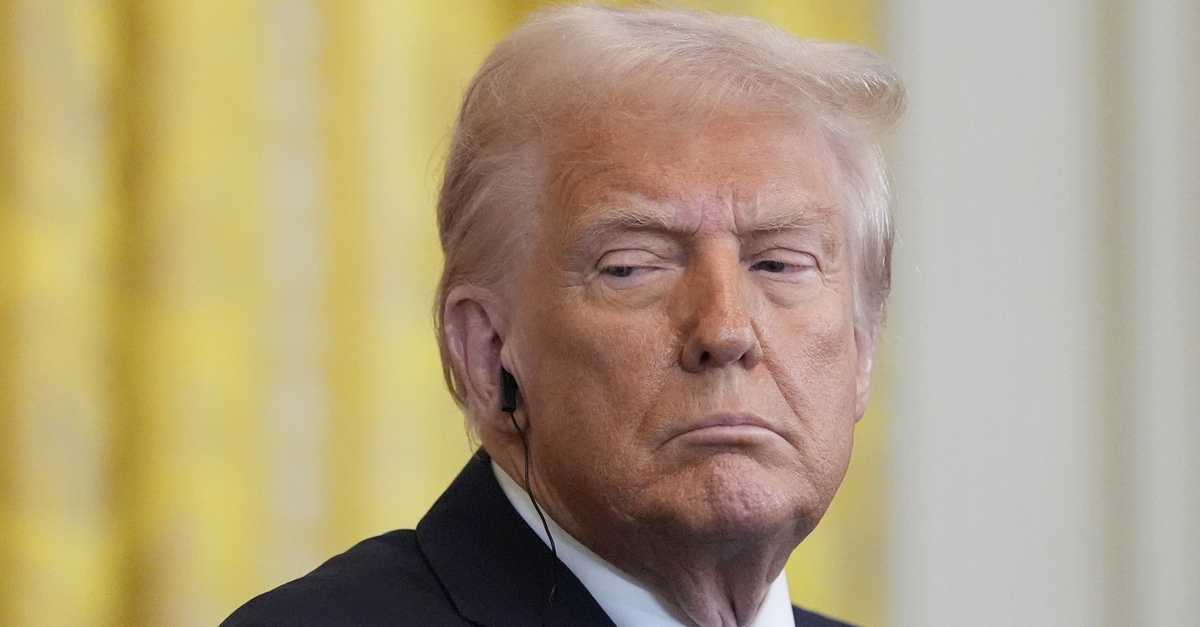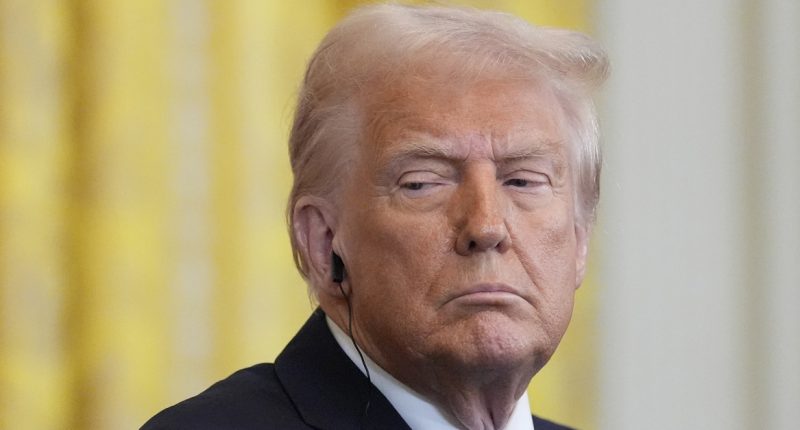
President Donald Trump listens during a news conference with Japanese Prime Minister Shigeru Ishiba in the East Room of the White House, Friday, Feb. 7, 2025, in Washington (AP Photo/Alex Brandon).
The controversy over the Trump administration’s use of an 18th century wartime authority to send alleged members of a Venezuelan gang to a notorious prison in El Salvador without due process continued Wednesday evening as attorneys representing five men who were nearly deported under the measure implored a federal judge to continue blocking deportations under the Alien Enemies Act of 1798 (AEA).
In a 42-page filing in Washington, D.C., federal court, the plaintiffs asserted that U.S. District Judge James E. Boasberg should reject the administration’s request that he lift a temporary restraining order halting such deportations, arguing that President Donald Trump improperly invoked the power during peacetime and subsequently justified its use by obfuscating facts and misleading the court.
“On the merits, the invocation of the Act against a criminal gang cannot be squared with the explicit terms of the statute requiring a declared war or invasion by a foreign government or nation,” the filing states. “The AEA, as noted, has been invoked only three times, all during declared wars. Defendants now seek to invoke this limited wartime authority to execute summary removals wholly untethered to any actual war or to the specific conditions Congress placed on this extraordinary authority. When the government asserts ‘an unheralded power’ in a ‘long-extant statute,’ courts ‘greet its announcement with a measure of skepticism.’ That skepticism is well warranted here.”
According to the filing, the administration’s contention that enjoining its use of the AEA would compromise national security is merely an excuse to fast-track deportations without providing defendants with constitutionally mandated due process.
The plaintiffs emphasized that the government had not even attempted to claim that those allegedly subject to removal under the AEA could not be safely housed in a domestic detention center. The administration even provided a sworn declaration stating that more than a quarter of the 178 individuals already sent to El Salvador were classified as “low threat” detainees.
The Justice Department on Wednesday filed court documents claiming Boasberg lacks jurisdiction to review its actions under the AEA. The administration stated that the court “has no basis to intrude into the conduct of foreign affairs by the government.”
The plaintiffs pushed back, proclaiming whether President Donald Trump can properly invoke the wartime statute and whether its prerequisites have been satisfied “is quintessentially one for the courts.”
“The implications of the government’s position are staggering,” plaintiffs wrote. “If the President can label any group as enemy aliens under the Act, and that designation is unreviewable, then there is no limit on who can be sent to a Salvadoran prison, or any limit on how long they will remain there. At present, the Salvadoran President is saying these men will be there at least a year and that this imprisonment is ‘renewable.””
The case has been a tinderbox for controversy since the Trump administration appeared to willfully flout Boasberg’s order on Saturday by refusing to abide by his order prohibiting the deportation of more than 100 migrants under the AEA. When the Justice Department informed Boasberg that two planes of such migrants had already departed for El Salvador, he ordered those flights to turn around and return to the country, but the administration did not, contending that the planes were outside of U.S. airspace.
Contentious exchanges between Boasberg and DOJ attorneys this week led to President Trump calling on the judge to be impeached from his lifetime appointment to the bench. A House Republican introduced articles of impeachment for Boasberg a short while later.
Trump’s diatribe against Boasberg led to a swift rebuke from Supreme Court Chief Justice John Roberts, who issued a rare public statement saying that “impeachment in not an appropriate response to disagreement concerning a judicial decision.”
The administration’s apparent willingness to spurn a direct order from a federal judge has left many legal scholars wondering if the U.S. is on the brink of a constitutional crisis.
“If anyone is being detained or removed based on the administration’s assertion that it can do so without judicial review or due process,” Jamal Greene, a law professor at Columbia, told The New York Times, “the president is asserting dictatorial power and ‘constitutional crisis’ doesn’t capture the gravity of the situation.”
Love true crime? Sign up for our newsletter, The Law&Crime Docket, to get the latest real-life crime stories delivered right to your inbox.







